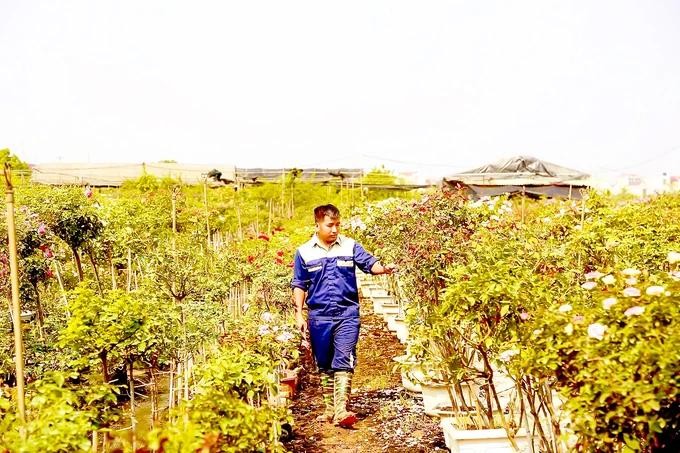
Super typhoon Yagi struck the Northern region in early September, inflicting significant damage on traditional craft villages in Hanoi. Local authorities estimate that approximately 30 percent to 40 percent of the cultivated area in the peach and kumquat gardens located in the Nhat Tan, Phu Thuong, and Tu Lien wards of Tay Ho District was impacted by the storm. One family reported the loss of nearly 500 kumquat trees and over 300 peach branches, resulting in damages amounting to nearly VND1 billion (US$39,331).
At present, the garden has only one-third of the trees it had before the typhoon, said a 59 year old owner of a peach and kumquat garden in Tu Lien Ward of Tay Ho District. He added that the family is focusing on nurturing the surviving trees and has had to bring in more trees from kumquat gardens in Hung Yen to meet the demands of customers for this Tet holiday.
Meanwhile, 46 year old man Chu Manh Hung who owns a peach garden in Nhat Tan Ward told reporters that his garden situated 1-2 meters above the road surface and far from the Red River, sustained minimal damage. He and his family are currently in the process of moving the peach trees into pots, preparing them for the upcoming Tet season.
Due to the unfavorable weather this year, including late cold spells, the process of stripping the peach leaves will be delayed compared to last year, with the expected timing now 20-30 days before the Lunar New Year.
Elsewhere in Hanoi’s Nam Tu Liem District, La Ca peach-growing villagers in Dai Mo Ward are also preparing for the traditional Tet peach blossom season.
According to some peach garden owners in Me Linh, for about 2 months now, traders from neighboring areas have come to buy peaches in large quantities, with some trees being sold for VND10 million-VND14 million. Most of the beautiful peach trees have been purchased, leaving only a few for retail and next year's crop.
Garden owners all predict that the market for peach blossoms, kumquats and other flowers for Tet 2025 will fluctuate greatly in price, because the supply is affected by storm No. 3. The price of peach blossoms, kumquats and fresh flowers for Tet 2025 is forecast to increase by 20 percent -30 percent compared to last year. Beautiful and rare trees will have high value.
In addition, the scarcity of goods due to natural disasters also creates a tendency for consumers to order earlier.
Despite the recent decline and volatility in the price of dragon fruit, it is observed that producers in Binh Thuan, the country's primary dragon fruit cultivation region, are maintaining large-scale production to satisfy market demand before, during, and after Tet 2025. In key dragon fruit cultivation areas of Binh Thuan Province including communes Ham Thuan Bac, Ham Thuan Nam, and Bac Binh, many growers have implemented lighting systems to facilitate the production of off-season fruit.
Chairman Huynh Canh of the Binh Thuan Dragon Fruit Association, anticipates that in the peak month of the 2025 Lunar New Year, the province will supply approximately 40,000 to 50,000 tons of dragon fruit to the market. At present, local farmers are concentrating on large-scale production of dragon fruit in preparation for the Tet season, resulting in significant pressure on consumption.
Binh Thuan Province with an area exceeding 27,000 hectares and producing more than 500,000 tons annually, stands as the foremost region for dragon fruit cultivation in the nation. Presently, approximately 80 percent of the dragon fruit produced locally is primarily exported to the Chinese market via unofficial channels, while the remainder is consumed domestically and in select European and Asian markets.
At this time, gardeners in Da Lat and surrounding areas are run off their feet planting flowers to serve the most important harvest season of the year. In traditional flower villages of Da Lat, including Van Thanh, Ha Dong, Thai Phien, and Xuan Thanh, approximately 1,300 hectares are cultivated with a variety of flowers such as daisies, lilies, sword lily, carnations, roses, African daisy, and orchids.
























